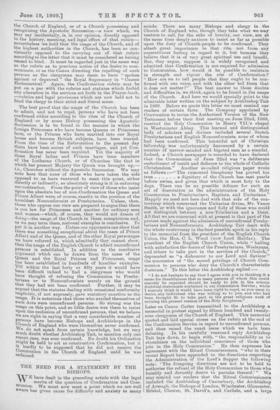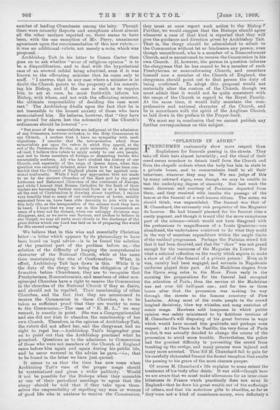THE NEED FOR A STATEMENT BY THE BISHOPS.
WE have dealt in the preceding article with the legal merits of the question of Confirmation and Com- munion. We must now meet a point which we are well aware has given cause for difficulty and anxiety to many minds. There are many Bishops and clergy in the Church of Englaud who, though they take what we may venture to call, for the sake of brevity, our view, are at the same time deeply anxious to insist as far as possible upon the duty of Church-people to be confirmed. They attach great importance to that rite, not from any superstitious feeling in regard to it, but because they believe that it is of very great spiritual use and benefit. But, they argue, suppose it is widely recognised and admitted that Confirmation is not required for admission to Communion, how would it be possible to maintain in strength and vigour the rite of Confirmation " How are we to tell people that they ought to be con- firmed. with one voice, and with the other tell them that it does not matter ?" The best answer to these doubts and difficulties is, we think, again to be found in the usage of the Church. And hero we would specially point to the admirable letter written on the subject by Archbishop Tait iu 1869. Before we quote this letter we must remind our readers of certain facts. The Company appointed by Convocation to revise the Authorised. Version of the New Testament before their first meeting on June 22nd, 1869, received the Holy Communion in Henry Vire chapel in Westminster Abbey. This learned and distinguished body of scholars and divines included several Scotch Presbyterians and English Nonconformists, none of whom had been confirmed. This beautiful act of Christian fellowship was unfortunately denounced by a certain number of narrow-minded and bigoted men as a scandal. Indeed, a Church newspaper is recorded to have declared that the Communion of June 22nd was " a deliberate embodiment of insult and defiance to the whole of Catholic Christendom." Another so-called religious paper wrote as follows :—" The rumoured blasphemy has proved too true a dignitary of the Church has cast pearls before swine, and given that which is most holy to the dogs. There can be no possible defence for such an act of desecration' as the administration of tbe Holy Communion to Presbyterians, Baptists, and Unitarians. Happily we need not here deal with that side of the con- troversy which concerned the Unitarian divine, Mr. Vance Smith, or with the ignorance and folly of those who could not distinguish between a non-Trinitarian and a Deist. All that we are concerned with at present is that part of the protest made against the admission of unconfirmed Presby- terians and Nonconformists. Archbishop Tait dealt with the whole controversy iu the best possible spirit in his reply to the memorial from the president of the English Church Union, the Hon. C. L. Wood (now Lord Halifax). The president of the English Church Union, while " hailing with satisfaction the desire of the Presbyterians, Wesleyans, and others to take part in the services of the Church," deprecated as "a dishonour to our Lord and Saviour" the concession of " the sacred privilege of Church Com- munion to persons who deny the Church's characteristic doctrines." To this letter the Archbishop replied :- " I do not hesitate to say that I agree with you in thinking it a cause for thankfulness that so many persons of whom this could scarcely be expected should be ready to join in the solemn doctrinal statements contained in our Communion Service ; while I scarcely think it would have been right to repel, as you seem to desire, any individual who was willing so to join, and who had been thought fit to take part in the great religious work of revising the present version of the Hely Scriptures."
Later on Canon Carter transmitted to the Archbishop a memorial in protest signed by fifteen hundred and twenty- nine clergymen of the Church of England. This Metnorial quoted: and laid special stress on the rubric at the end of the Confirmation Service in regard to unconfirmed person's, and thus raised the exact issue which we have been debating. In his carefully reasoned reply Archbishop Tait lays down, to begin with, " the responsibility as to attendance on the individual conscience of those who join in the Holy Communion." He then expresses his agreement with the Ritual Commissioners, " who in. their recent Report have appended to the directions respecting the Administration of the Lord's Supper the following note: ' The foregoing directions are not to be held to authorise the refusal of the Holy Communion to those who humbly and devoutly desire to partake thereof.' " We may remind our readers that the Ritual CoMmissioners included the Archbishop of Canterbury, the Archbishop of Armagh, the Bishops of London, Winchester, Gloucester, Bristol, Chester, St. David's, and Carlisle, and a large nuinbei of leading Churchman among the laity. Though there were minority Reports and exceptions about almost all the other matters reported on, there seems to have been, with the one exception of Mr. Perry, unanimous agreement upon the recommendation of this new rubric,-- it was an additional .rubrie, not merely a, note, which was proposed.
Archbishop Tait in his letter to Canon Carter then goes on to ask whether "error of religious opinion" is to be a disqualification, and to deal with the hypothetical case of an avowed infidel being admitted, even if it was known to the officiating minister that he came only to scoff. " I answer, that in any case where a minister. is in doubt the Church points to the propriety of his consult- ing his Bishop, and if the case is such as to require him to act at once, he must forthwith inform his Bishop, with whom, and not with the officiating minister, the ultimate responsibility of deciding the case must rest." The Archbishop dwells upon the fact that he is not insensible to the honest anxiety of those who have memorialised him. He believes, however, that "they have no ground for alarm lest the solemnity of the Church's ordinances should be lowered " :— " But some of the memorialists are indignant-at the admission of any Dissenters, however orthodox, to the Hely Communion in our Church. I confess that I have no •sympathy with such objections. I consider that the interpretation which these memorialists put upon the rubric to which they appeal, at the end of the Comatunion Service, is quite untenable. As at present adisea, I believe this rubric to apply solely to our own people, and not to those members of foreign or dissenting bodies who occasionally conform. All who have studied the .history of our Church, and especially of the reign of Queen Anne,,when this question was earnestly debated, must know hew it has been con- teeded that the Church of England places no bar against' occa- sional conformity. While I hail any approaches that are made to us by the ancient Churches. of the East and by the great Lutheran and Reformed Churches of, the continent of Europe, and while.' lament that Roman Catholics by the fault of their leaders are becoming further removed from us at a time when all the rest of Christendom is drawing closer together, I rejoice very heartily that so many of our countrymen at home, usually separated from us, have been able devoutly .to join with us in this holy rite, as the inauguration of the solemn work they have in hand. I hope that we may see in this Holy Communion an omen of a time not far distant, when our unhappy divisions may disappear, and, as we servo one Saviour, and profess to believe in one Gospel, we may all unite more closely in the discharge of the great duties which' our Lord has laid on us of preparing the world for His second coming."
We believe that in this wise and essentially Christian letter—a letter which appears by its phraseology to have. been based on legal advice—is to be found' the solution of the practical part of the problem before us,—the solution of the difficulty of keeping the comprehensive character of the National Church, while at the same tinie • maintaining the rite of Confirmation. What, in effect, Archbishop Tait lays down is this. While it is' the duty• of the clergy to bring,the obligation of Con- firmation before Churchmen, they are to 'recognise that Presbyterians, Nonconformists, and members of other non- episcopal Churches have a right to receive the Communion in the churches of the National Church if they so desire, and should not be repelled. Their membership of other Churches, and the fact that they are accustomed to receive the Communion in those Churches, is to be taken as sufficient proof that they are worthy to come to the Communion.---The case of " E. M. L., ' we may remark, is exactly in point. She was a Congregationalist and she did not wish to abandon the membership of her own Church. Therefore, in the opinion of Archbishop Tait, the rubric did not affect her, and the clergyman had no right to repel her.—Archbishop Tait's biographer goes on to point out that the Archbishop practised what he preached. Questions as to the admission to Communion of those who were not members of the Church of England came before him again and again during his public life, and lie never watered in the advice he gave,—i.e., that to be found in the letter we have just quoted.
It seems to us that the time has now come when Archbishop Tait's view of the proper usage ' should be 'systetnatised and given a wider publicity. Would it not be possible for the Bishops when they assemble at one of 'their periodical meetings to • agree that the clergy -should 'be told - that if they take upon them- selves the •responsibility of repelling any man or' woman of' good life. who is anxious to receive tit.° Communion, they must at once report such action to the Bishop ? Further, we would suggest that the Bishops' should agree whenever a case of that kind is reported that they will give the guidance and direction given by Archbishop Tait. That is, the clergy should be admonished to admit to the Communion without let or hindrance any person, even though unconfirmed, who is a member of. a Nonconformist Church, and is accustomed to receive the Communion in his own Church. If, however, the person in question informs• the clergyman that he has ceased to be a member of such Presbyterian or nonconforming Church, and considers himself now a member of the. Church of England, the clergyman should point out to that. person the duty of, being confirmed. To adopt this proposal would not materially alter the custom of the Church, though we must admit that it would not be quite consistent with the usage of the Church in regard to the Royal Family. At the same time, it would fully .maintain the com- preheusive and national character of the Church, and be in accordance with the spirit of the Anglican Church, as laid down in the preface to the Prayer-book.
We must say in conclusion that we cannot publish any further correspondence on this subject. .











































 Previous page
Previous page